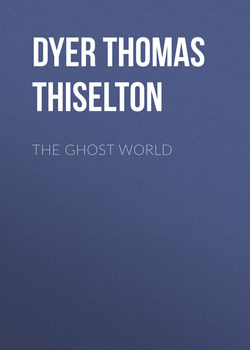The Ghost World

Реклама. ООО «ЛитРес», ИНН: 7719571260.
Оглавление
Dyer Thomas Firminger Thiselton. The Ghost World
CHAPTER I. THE SOUL’S EXIT
CHAPTER II. TEMPORARY EXIT OF SOUL
CHAPTER III. THE NATURE OF THE SOUL
CHAPTER IV. THE UNBURIED DEAD
CHAPTER V. WHY GHOSTS WANDER
CHAPTER VI. GHOSTS OF THE MURDERED
CHAPTER VII. PHANTOM BIRDS
CHAPTER VIII. ANIMAL GHOSTS
CHAPTER IX. PHANTOM LIGHTS
CHAPTER X. THE HEADLESS GHOST
CHAPTER XI. PHANTOM BUTTERFLIES
CHAPTER XII. RAISING GHOSTS
CHAPTER XIII. GHOST LAYING
CHAPTER XIV. GHOSTS OF THE DROWNED
CHAPTER XV. GHOST SEERS
CHAPTER XVI. GHOSTLY DEATH-WARNINGS
CHAPTER XVII ‘SECOND SIGHT’
CHAPTER XVIII. COMPACTS BETWEEN THE LIVING AND DEAD
CHAPTER XIX. MINERS’ GHOSTS
CHAPTER XX. THE BANSHEE
CHAPTER XXI. SEA PHANTOMS
CHAPTER XXII. PHANTOM DRESS
CHAPTER XXIII. HAUNTED HOUSES
CHAPTER XXIV. HAUNTED LOCALITIES
CHAPTER XXV. CHECKS AND SPELLS AGAINST GHOSTS
CHAPTER XXVI. WRAITH-SEEING
CHAPTER XXVII. GHOSTLY TIMES AND SEASONS
CHAPTER XXVIII. SPIRIT-HAUNTED TREES
CHAPTER XXIX. GHOSTS AND HIDDEN TREASURES
CHAPTER XXX. PHANTOM MUSIC
CHAPTER XXXI. PHANTOM SOUNDS
Отрывок из книги
Many of the conceptions of the human soul formed by savage races arose from the phenomena of everyday life. According to one of the most popular dream theories prevalent among the lower races, the sleeper’s soul takes its exit during the hours of slumber, entering into a thousand pursuits. Now, as it is well known by experience ‘that men’s bodies do not go on these excursions, the explanation is that every man’s living self, a soul, is his phantom or image, which can go out of his body and see, and be seen itself, in dreams.’24 In the opinion of the savage, therefore, dreams have always afforded a convincing proof of the soul’s separate existence, and Dr. Tylor considers that ‘nothing but dreams and visions could ever have put into men’s minds such an idea as that of souls being ethereal images of bodies.’
Thus the Dayaks of Borneo believe that in the hours of sleep the soul travels far away, and the Fijians think that the spirit of a living man during sleep can leave the body and trouble some one else. But Mr. E. im Thurn, in his ‘Indians of Guiana’ (344-346), gives some very striking instances of this strange phase of superstitious belief: ‘One morning, when it was important to me to get away from a camp on the Essequibo River, at which I had been detained for some days by the illness of some of my Indian companions, I found that one of the invalids, a young Macusi Indian, though better in health, was so enraged against me that he refused to stir, for he declared that, with great want of consideration for his weak health, I had taken him out during the night, and had made him haul the canoe up a series of difficult cataracts. Nothing could persuade him that this was but a dream, and it was some time before he was so far pacified as to throw himself sulkily into the bottom of the canoe. At that time we were all suffering from a great scarcity of food, and, hunger having its usual effect in producing vivid dreams, similar events frequently occurred. More than once the men declared in the morning that some absent men whom they named had come during the night, and had beaten, or otherwise maltreated them; and they insisted on much rubbing of the bruised parts of their bodies.’25
.....
Ghosts, when they make their appearance, are generally supposed, as already noticed, to have a perfect resemblance, in every respect, to the deceased person. Their faces appear the same – except that they are usually paler than when alive – and the ordinary expression is described by writers on the subject as ‘more in sorrow than in anger.’ Thus, when the ghost of Banquo rises and takes a seat at the table, Macbeth says to the apparition —
And Horatio tells Marcellus how the ghost of Hamlet’s father was not only fully armed, but —
.....